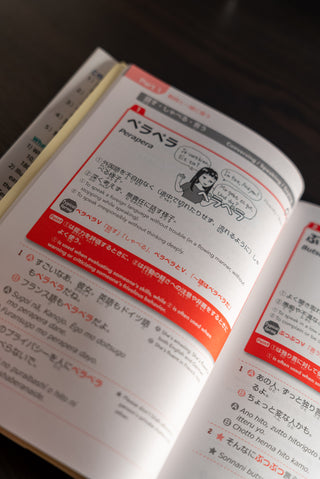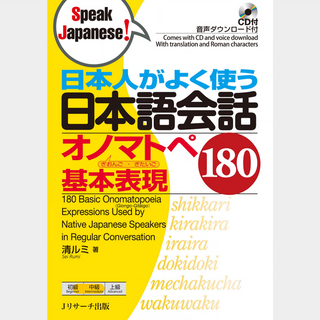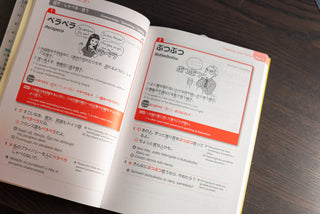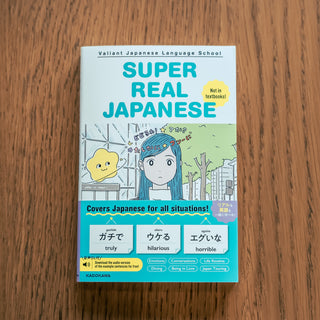Japanese speakers frequently use Onomatopoeia expressions, with 180 basic expressions. 日本人がよく使う日本語会話 オノマトペ基本表現180.
Onomatopoeic expressions are used very often in Japanese conversations. It isn't possible to express yourself naturally in Japanese without knowing onomatopoeias, nor can proper conversations be had at all.
While onomatopoeias play such a vital role in Japanese, they unfortunately appear infrequently in Japanese learning textbooks, and when they do, they often appear in fragmentary ways.
That is why this book shines a spotlight on onomatopoeias that are important to accurately conveying what you want to say, carefully selecting only the most fundamental terms. It consists of four major parts, onomatopoeias used together with verbs, ones that express what is notable about an action or change, ones that express or highlight the state of something, and ones that express a mental or emotional state. From there, terms are sorted into more narrow classifications based on theme or characteristic in order to make this book even easier to use. Each term also has a thorough explanation regarding how it is used, written at around the JLPT N3 level. Effective illustrations that make it easier for you to understand the nuances of each term are included as well, as are conversation examples of situations where Japanese people would frequently use the term. The attached voice recordings should also help you to get an even stronger understanding of the nuances of each term.
We hope you become able to use Japanese in an even more natural way by learning onomatopoeias. - Rumi Sei
(Please note any discounts to shipping does not apply to book products)
Shipping (Japan Postal Service)
For International shipping, time may vary depending on location. Expect 7-14 Working days minimum.
Japanese speakers frequently use Onomatopoeia expressions, with 180 basic expressions. 日本人がよく使う日本語会話 オノマトペ基本表現180.
Onomatopoeic expressions are used very often in Japanese conversations. It isn't possible to express yourself naturally in Japanese without knowing onomatopoeias, nor can proper conversations be had at all.
While onomatopoeias play such a vital role in Japanese, they unfortunately appear infrequently in Japanese learning textbooks, and when they do, they often appear in fragmentary ways.
That is why this book shines a spotlight on onomatopoeias that are important to accurately conveying what you want to say, carefully selecting only the most fundamental terms. It consists of four major parts, onomatopoeias used together with verbs, ones that express what is notable about an action or change, ones that express or highlight the state of something, and ones that express a mental or emotional state. From there, terms are sorted into more narrow classifications based on theme or characteristic in order to make this book even easier to use. Each term also has a thorough explanation regarding how it is used, written at around the JLPT N3 level. Effective illustrations that make it easier for you to understand the nuances of each term are included as well, as are conversation examples of situations where Japanese people would frequently use the term. The attached voice recordings should also help you to get an even stronger understanding of the nuances of each term.
We hope you become able to use Japanese in an even more natural way by learning onomatopoeias. - Rumi Sei
(Please note any discounts to shipping does not apply to book products)
Shipping (Japan Postal Service)
For International shipping, time may vary depending on location. Expect 7-14 Working days minimum.

onomatopoeia
The Japanese language has a large inventory of sound symbolic or mimetic words, known in linguistics as ideophones. Such words are found in written as well as spoken Japanese.





